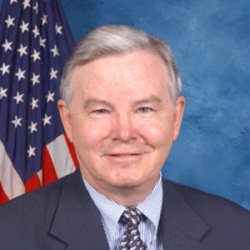Joe Barton To Counter RAWA With Federal Online Poker Bill

Representative Joe Barton (R-Arlington) took over the mantle of US online poker defender from Barney Frank after the Democrat Representative retired in 2012, and over the years Barton has helped champion online poker player rights across the US, including introducing a number of bills into the House of Representatives. Defending his Internet Poker Freedom Act (2013) at the time, Barton said:
“A lot of congressmen are opposed to pure games of chance. In terms of defending the bill, it’s much easier to defend poker because it’s a game of skill and you don’t come across many people who challenge that.”
The UIGEA‘s reinterpretation and subsequent spread of regulated online poker to three states, however, saw Barton ease off on his call for a federal internet poker bill, but following Rep. Jason Chaffetz (R – Utah) introducing his Restoration of America’s Wire Act (RAWA) in February, Rep. Barton has indicated he now intends to counter the move by presenting a new pro federal poker bill of his own.
Barton And The Poker Players Alliance
Rep. Jason Chaffetz’s RAWA bill has some powerful supporters, including the billionaire casino mogul Sheldon Adelson who has made it his mission to halt the spread of internet gambling throughout the United States. Nevertheless, Barton’s proposed bill will certainly have some formidable backers of its own, not least the Poker Players Alliance, a grassroots advocacy group with over one million members across the US. Other high profile supporters of a federal poker bill would also likely include major casino operators such as Caesars Entertainment and MGM Resort International, both of whom have offered their support for online poker regulation in the past.
Different Approach Than Franks
Unlike Barney Franks who advocated for a comprehensive internet gambling bill, arguing that adults should be free to spend their money in any way they saw fit, Joe Barton has taken an all together different approach and is seeking to legalize online poker only. In so doing, Barton has managed to avoid any inconsistencies with his image as a staunch social conservative by separating games of skill such as poker from general gambling, and Barton even admits to each year taking three or four trips from his Dallas home in North Texas to neighboring Oklahoma to play poker. As the US Congressman told the Dallas Fort Worth Star-Telegram last week:
“It’s very ironic that Texas hold ’em poker is played everywhere legally except in Texas. But one of these days that will change.”
A Few Sticking Points
A major criticism of Barton’s bill may be the same one that is currently being used against RAWA, namely that it gives too much power to the federal government to regulate what individual states can offer their respective residents. Nevertheless, apparently Barton’s bill would seek to set up a federal iGaming framework complete with consumer safeguards, whilst leaving the option to allow residents to play online poker solely in the hands of the state. As Barton told the Texas Star Telegram:
“Folks who think they can stand in a pulpit and tell people how to run their lives and tell states how to run their businesses don’t see the same Constitution I do.”
Another potential sticking point could be the poker-only dimension of the bill, unlike in the early days of online gambling legislation when poker analysts seemed to believe the game could survive on its own without the need for other online casino games. More than one year of results later, however, and this myth has well and truly been shattered, with PPA Executive Director John Pappas stating that online casino games were vital in advancing the online poker industry. Nevertheless, the PPA would still likely support an online poker-only bill, rather than see RAWA succeed in forcing a complete online gambling ban nationwide. However, even RAWA supporters are currently considering allowing carve-outs for horse racing, and fantasy sports.
Finally, by all accounts Barton’s proposed piece of legislation would seek to impose even stricter regulations than those presently imposed by regulated states, including only permitting deposit to be made through debit card, in an effort to stop people from ringing up gambling debts on their credit cards. While well intentioned, in practicality such a measure would simply serve to raise another barrier of access for the online gambling industry.









